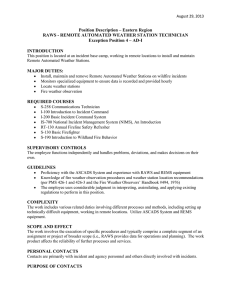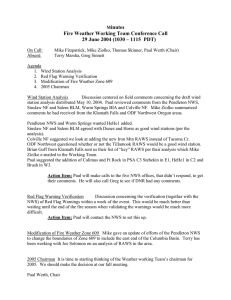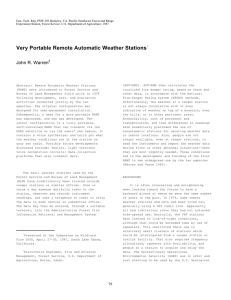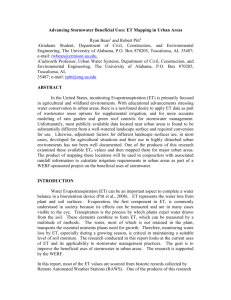RAWS STATION MEETING NOTES
advertisement
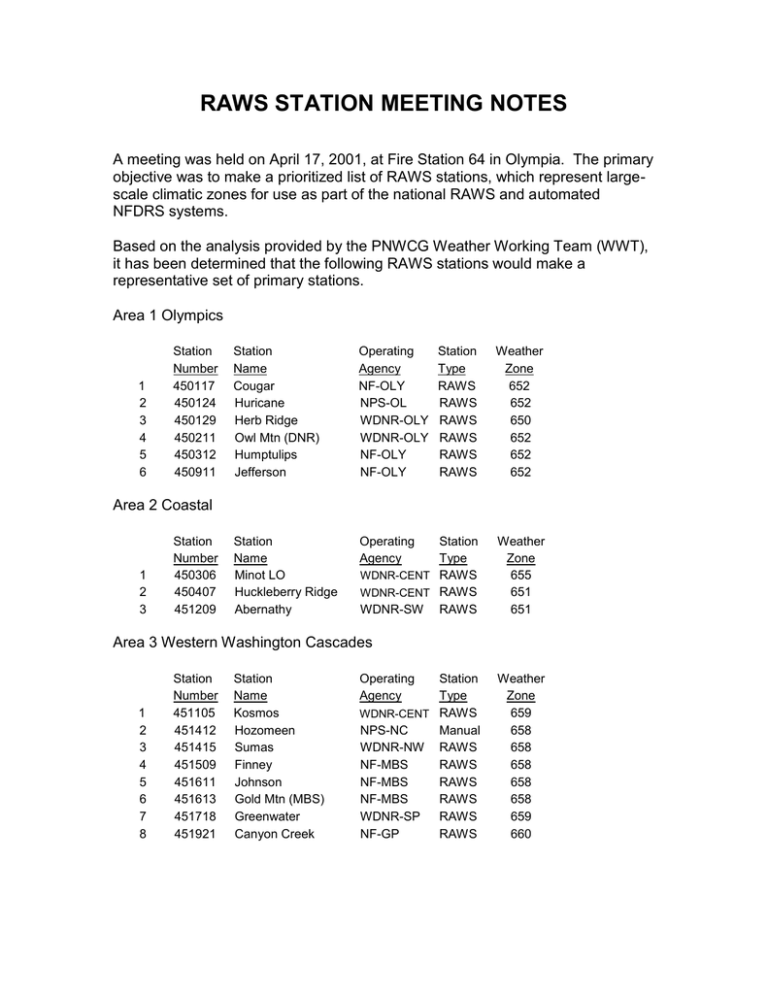
RAWS STATION MEETING NOTES A meeting was held on April 17, 2001, at Fire Station 64 in Olympia. The primary objective was to make a prioritized list of RAWS stations, which represent largescale climatic zones for use as part of the national RAWS and automated NFDRS systems. Based on the analysis provided by the PNWCG Weather Working Team (WWT), it has been determined that the following RAWS stations would make a representative set of primary stations. Area 1 Olympics 1 2 3 4 5 6 Station Number 450117 450124 450129 450211 450312 450911 Station Name Cougar Huricane Herb Ridge Owl Mtn (DNR) Humptulips Jefferson Operating Agency NF-OLY NPS-OL WDNR-OLY WDNR-OLY NF-OLY NF-OLY Station Type RAWS RAWS RAWS RAWS RAWS RAWS Weather Zone 652 652 650 652 652 652 Station Name Minot LO Huckleberry Ridge Abernathy Operating Agency Station Type WDNR-CENT RAWS WDNR-CENT RAWS WDNR-SW RAWS Weather Zone 655 651 651 Area 2 Coastal 1 2 3 Station Number 450306 450407 451209 Area 3 Western Washington Cascades 1 2 3 4 5 6 7 8 Station Number 451105 451412 451415 451509 451611 451613 451718 451921 Station Name Kosmos Hozomeen Sumas Finney Johnson Gold Mtn (MBS) Greenwater Canyon Creek Operating Agency Station Type WDNR-CENT RAWS NPS-NC Manual WDNR-NW RAWS NF-MBS RAWS NF-MBS RAWS NF-MBS RAWS WDNR-SP RAWS NF-GP RAWS Weather Zone 659 658 658 658 658 658 659 660 Note: Herb Ridge will be moved this fire season to Ellis Mt. and issued a new NWS station number. The Huckleberry Ridge site will be looked at to possibly replace Willapa, which is now a DNR manual station. Hozomeen is currently a manual site but will converted to a RAWS station this fire season. If accepted by the PNWCG steering committee, these stations will be considered priority sites. This means that the owners of the stations would accept the following responsibilities for the key RAWS sites. Priority Site Requirements: 1. 2. 2. 3. 4. Maintain RAWS sites to all current and future NFDRS standards. Purchase the latest required RAWS hardware and software. Ensure minimum down time during the fire season. Change reporting times to near 2pm LST for input into WIMS if necessary. Provide on-going vegetation control and site maintenance. While the RAWS stations listed here represent a subset of all weather stations statewide, the WWT is not suggesting other stations statewide should be removed or changed. These other stations are important for smoke management, forecasting, research, IFPL’s , spot forecasts, etc. However, the WWT is suggesting that all weather stations used should be maintained like priority sites. During the next 5-10 years, all manual stations will be replaced by RAWS type stations and the current FAA stations now used in Washington will also be add to the National Weather database. This will allow real-time analysis of fire danger and weather conditions on a 24-7 basis. This may also lead to help in assessing both current fire danger and dispatching as conditions change over the fire season. For background purposes, the data presented by the WWT can be downloaded at http://www.fs.fed.us/r6/fire/pnwcgfiles/weatherworkingt_/default.htm

